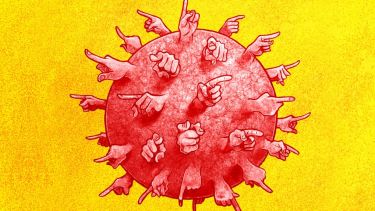There’s a novel spin on the blame game looming: lawsuits against those who negligently or intentionally caused others to become infected with Covid-19 by, for example, refusing to get vaccinated against it.
One form is a civil suit brought by an individual who contracted Covid-19, or their relative, against another individual such as a teacher or care home worker who refused a vaccine and from whom the plaintiff’s infection can be easily traced (the school or home might also be sued, in this scenario). The second is a class action against an organisation that spread vaccine misinformation, such as Children’s Health Defense, chaired by Robert Kennedy Jr, or America’s Frontline Doctors.
If neither kind of suit has been announced so far, it’s because both face big hurdles. The article highlights both the problems of proving causation but also in terms of determining negligent behaviour and duty of care in common law jurisdictions whose law already tends to place the individual before the collective.
What makes vaccination to be such a challenging issue, is that the risks and benefits of vaccinating affect both the person taking or avoiding it and others. It hence raises a question of fairness and cooperation and a framing question of whether refusal to vaccinate is an active creation of risk, for which duty is readily imposed, or a failure to confer a benefit – a failure to rescue another from an external risk – for which in general there is no duty and liability.
In recent decades, people who have suffered vaccine injury have generally been compensated through a no-fault damage payment scheme rather than via the courts. The willingness to compensate someone who contracted the disease even though to offer the vaccination is not considered unreasonable suggests that the rationale is that of fairness: the person who vaccinated also serves the public interest so should be compensated if harmed in doing so. But if this is the case, taking the jab is likely to be framed as conferring a benefit, so a failure to do so is likely to be considered as a failure to confer a benefit, so it is far from sure that a duty would be imposed for such a refusal. Other complexities (not discussed in the article) are the determination whether refusal to vaccinate is unreasonable, and as far as claims against anti-vax campaigners for fake news are involved, issues of both causation and freedom of expression.
But even if a test case was to fail, it would probably shift the debate over where the balance should be struck between individual and collective rights and responsibilities. That debate is already under way, with proposals ranging from holding negligent Covid spreaders liable for the costs of tracking (within a tort law framework, there is an issue of limited duty of care for economic loss) and containing the outbreak they caused, to criminalising their behaviour as dangerous driving is criminalised. On one side are those who want more legal protection for the collective, on the other those who argue that coercion is not the way, and could backfire by pushing the vast majority of vaccine refusers – who merely have doubts or questions – into more extreme positions."
Professor Tsachi Keren-Paz
Read the full article here.

